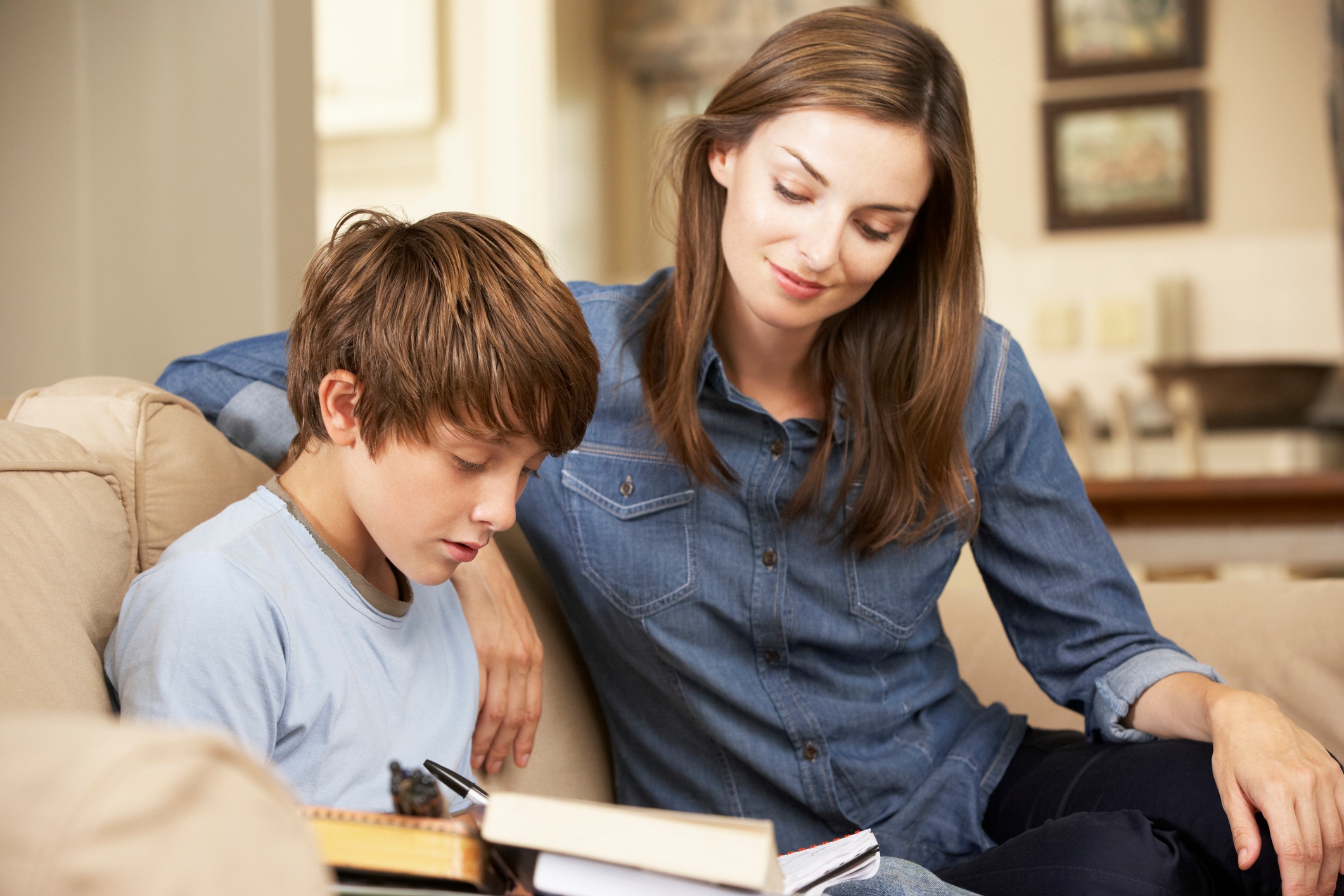Psychology Today has this to say about stress. "Stress generally refers to two things: the psychological perception of pressure, on the one hand, and the body's response to it... Lifesaving as the stress response was meant to solve short-term, life-threatening problems, not extended difficulties ... Prolonged or repeated arousal of the stress response, a characteristic of modern life, can have harmful physical and psychological effects."
However, it is the perception of a threat by you and your child that determines whether or not a cascade of survival chemicals is triggered and dumped into your system. And that makes it imperative that you teach your children how to draw helpful conclusions about their experiences to prevent the adverse effects of stress. Therefore, one of parents' crucial jobs is to help their children and teens take effective action in response to their experiences rather than become overwhelmed by life's challenges.
 Keep in mind that a certain amount of challenge is healthy because it encourages children to grow, inspires problem-solving, and sparks a child's desire and determination to exceed their previous skill level. However, too many demands without adequate support, rejuvenation, and downtime can cause unhealthy distress.
Keep in mind that a certain amount of challenge is healthy because it encourages children to grow, inspires problem-solving, and sparks a child's desire and determination to exceed their previous skill level. However, too many demands without adequate support, rejuvenation, and downtime can cause unhealthy distress.
On any given day, a child has many varied experiences, some positive, some neutral, and others negative. How the child perceives each experience will determine how they feel, which impacts how they respond. And the meaning and conclusions they draw from ongoing experiences help to form their self-concept. Let's look at some typical challenges.
Common Stressors for Children and Teens
- changing teachers, schools or classrooms
- moving to a different home and neighborhood
(For families with small children, see "Ease Moving Stress for Small Children." - juggling academic demands with sports (and other school-related
and social activities) - struggling or getting behind academically, possibly failing
- feeling picked on by siblings or classmates
- loss of a friend or pet
- being different developmentally (i.e., taller or smaller, slower learner, emotionally sensitive, clumsy, etc.)
- peer pressure or feeling left out
- technology fatigue
- being embarrassed or singled out by peers or adults
- parents fighting or divorcing
- stressed out or absent parents
 Regrettably, sometimes parents can unwittingly cause greater stress that contributes to their children's overwhelm. You know those days when you're at your wits' end. You react, your frustration boils over, and your interactions with your child become strained. Or maybe you're just zoning out on your phone.
Regrettably, sometimes parents can unwittingly cause greater stress that contributes to their children's overwhelm. You know those days when you're at your wits' end. You react, your frustration boils over, and your interactions with your child become strained. Or maybe you're just zoning out on your phone.
If parents are stressed-out and crazy-busy themselves, they're often unable to provide a calming space for children to chill and recharge. When adults are too preoccupied with their busy schedules, they miss opportunities for giving encouragement, capturing moments of meaningful dialogue, and spending quality time together. And if parental expectations are too high for a child's academics or sports, these can unintentionally cause a child apprehension and an experience of prolonged pressure, the earmarks of stress.
PARENTS: Take care of yourself!
 Before you can support your child in their stress, you need to ensure that you're not part of the problem. Therefore, self-care is critical for parents. Relaxing, exercising, going out on a date night with your spouse, and enjoying a favorite hobby are nonnegotiable. Practicing yoga, or learning how to be mindful can assist you. Making your needs important in the midst of life's demands is vital for finding inner peace, creating a calmer life, and being more conscious in your parenting. Do whatever helps you stay balanced and in your heart!
Before you can support your child in their stress, you need to ensure that you're not part of the problem. Therefore, self-care is critical for parents. Relaxing, exercising, going out on a date night with your spouse, and enjoying a favorite hobby are nonnegotiable. Practicing yoga, or learning how to be mindful can assist you. Making your needs important in the midst of life's demands is vital for finding inner peace, creating a calmer life, and being more conscious in your parenting. Do whatever helps you stay balanced and in your heart!
Identify Important Cues of Your Child's Unrest and Stress
Next, it's important to be able to identify the symptoms of stress in your child or teen. By being alert to their behaviors, listening to them, and helping them with stressful situations, they get the necessary support and relief. By seizing moments for conversation, parents help children learn to perceive their lives in new ways.
Signs that Your Child or Teen May Be Over Stressed
- complains about stomach aches
- avoids or procrastinates homework
- exhibits behavioral changes (unrelated to developmental stages)
- doesn't want to play with friends
- refuses to go to athletic practices or games
- acts unkindly to siblings or pets
- withdraws from family
- gets argumentative
- engages in power struggles
- erupts unexpectedly over seemingly small things
- talks excessively (or very little)
- restless sleep or nightmares
- dramatic changes in eating or sleeping habits
So, what do you do when you notice behavior that feels strained? No matter the problem, it's essential to cultivate times for connection and conversation with your children. And then, you want to truly listen without interrupting. Listen without fixing. And empathizing can go a long way in helping your child to deal with stress and cope with their daily challenges.
Vital Parental Actions that Reduce Stress and Teach Stress Management to Kids
1) Describe What You See
Especially for very young children, share your observations:
- What is their facial expression? (Sad, happy, angry, etc.)
- What is their body language telling you? (Hands crossed, fist clenched, etc.)
- What is the tone of their voice? (Discouraged, excited, etc.)
Helping children identify their feeling is the first step in managing life's ups and downs. Sometimes a child will say they are fine, but their body language can say otherwise. ("Fine" can mean "leave me alone, don't leave me alone.")

2) Teach Children to Self-Calm
Learning to calm oneself and control emotions are emotional intelligence skills that are fundamental in handling stress productively.
Giving children consistent practice in self-quieting is vital in the development of emotional resilience.
Succumbing to anxiety, depression, or other unhealthy reactions to experiences increase a sense of powerlessness. However, when a child can make a decision to take a break and regain their balance to get a healthier perspective, it builds self-confidence. Once a child or teen learns that it's possible to shift their emotions and draw helpful conclusions about their experiences, they feel empowered.
Self-quieting does not require the child to go away and sit for a certain amount of time, like in time-out. Children are extremely responsive and they can restore peace very quickly. They might sit under a bush in your backyard and draw a picture or listen to music; they might jump on a trampoline, go for a walk, or cuddle with your pet. Some children want to be alone; others want to be close to family.
Each child has specific ways to soothe—and believe it or not, they know what they are! However, children might need a little priming to excavate and practice their self-knowledge.
And you can assist them by spotting times when they need to quiet themselves, preferably before they're too worked up. The more they practice regulating their emotions and self-calming, the greater likelihood of avoiding burnouts or meltdowns.
Messages Parents Give When Modeling Self-Calming
Also, one of the most powerful influences as a parent is modeling self-calming yourself when you're frustrated or exasperated. This demonstrates two things:
- a parent is human
- each person is responsible for their feelings, behavior, and experience.
- we have the power to change the way we feel when we take accountability.
Great messages, don't you think?
3) Help Children to Shift Negative Self-Talk to a Focus on Their Strengths
One of the habits that can drag a child down is how they talk to themselves. Negative self-talk is very common, even for adults. Thoughts invoke emotions. It's important to help children make the connection that their thoughts influence how they feel. Once they understand that they can change the way they feel by changing the way they think, they are captains of their experiences, not victims.

Each person is responsible for what they think and how they feel. It's NOT your job as a parent to make your children happy. Your job is to help them to make themselves happy by engaging with life positively and embracing their strengths and what energizes them to succeed. A great way to help a child shift their mindset is to redirect them to their strengths. But first, you'll need to train yourself to see your child's strengths!
It's the brain's natural tendency to look for what's wrong in our environment to keep us safe and to help us grow and improve ourselves. Helping your child shift their negative self-talk and turn their attention to their natural strengths is both encouraging and effective.
Conclusions that invoke proactive attitudes and constructive actions are the gateways to more successful relationships and happier life.
To learn more about managing stress, emotional intelligence, and conscious parenting, sign up now for our HeartMail newsletter or contact us at jennifer@heartmanity.com.









